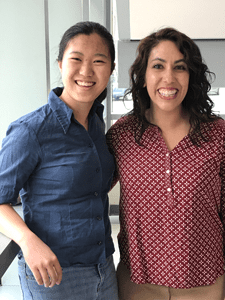Media Contact:
Nalini Padmanabhan
ASHG Communications Manager
301.634.7346
press@ashg.org
Embargoed for Release
Tuesday, April 25, 2017
12:00 pm U.S. Eastern Time
High School Contest Addressed Modern Examples of Gene Therapy

BETHESDA, MD – In commemoration of National DNA Day, the American Society of Human Genetics (ASHG) hosted the 2017 DNA Day Essay Contest to encourage high school students and teachers to learn about human genetics concepts beyond the standard curriculum. This year, ASHG awarded first place to Adele Peng, a freshman at Thomas Jefferson High School for Science and Technology in Alexandria, Va. Sophia Spiegel, a junior at Bergen County Academies in Hackensack, N.J., won second place in the contest. Alvin Ya, a senior at Poolesville High School in Poolesville, Md., was awarded third place.
“Recent advances in biology have made gene therapy, the focus of this year’s contest, more promising than ever, and have expanded the field beyond its original concept,” said Michael Dougherty, PhD, Director of Education for ASHG. “We were interested to see students’ perspectives on these advances and their potential effects in the clinic.”
National DNA Day, celebrated annually on April 25, commemorates the discovery of DNA’s double helix structure and the completion of the Human Genome Project, two key milestones in the field of genetics. Each year since 2006, ASHG has run a DNA Day Essay Contest to challenge students to examine, question, and reflect on important concepts in human genetics by writing an original essay. Winning essays use well-reasoned arguments to show a grasp of topics that are not always well-covered in high school biology courses.
This year, the contest invited students to choose one modern example of gene therapy, describe the disease or condition researchers are attempting to treat, and explain how the therapy/approach might repair the underlying cause of the disease or condition.
Students from 38 U.S. states and 21 non-U.S. countries submitted essays to the contest this year. Human genetics specialists belonging to ASHG and its leadership read and evaluated entries for their scientific accuracy, creativity, and overall writing quality.
“This year’s essays continue the tradition of high-quality submissions by high school students from the U.S. and abroad that we have seen for the past 12 years, and their enthusiasm for the science reflects the excitement that our members feel about their work,” said Joseph D. McInerney, MS, Executive Vice President of ASHG. “Through this contest and our other K-12 initiatives, we hope to encourage young people to explore and enjoy genetics.”
ASHG will award monetary prizes to winning students as well as grants for genetics laboratory equipment to eligible teachers. Peng, whose essay described the research into using zinc finger nucleases to immunize against HIV, will receive a $1000 prize. Spiegel, whose essay described efforts to use recombinant adeno-associated virus vectors in treating Leber’s Congenital Amaurosis, will receive a $600 prize. Ya, whose essay described studies of CRISPR/Cas9’s potential to treat muscular dystrophy, will receive a $400 prize.
Honorable mentions were awarded to 11 students, each of whom will receive a $100 monetary prize. The recipients of honorable mentions, listed alphabetically by last name, are:
- Blake Holman, a senior at Lake Dallas High School in Corinth, Texas
- Jio Jeong, a sophomore at Seoul International School in Seongnam-si, South Korea
- Lucy Liu, a junior at Illinois Mathematics and Science Academy in Aurora, Ill.
- Alleanna Marquez, a junior at Whitestation High School in Memphis, Tenn.
- Rhea Park, a junior at Head-Royce School in Oakland, Calif.
- Tharushi Perera, a junior at Staten Island Technical High School in Staten Island, N.Y.
- Arielle Rothman, a senior at North Shore Hebrew Academy High School in Great Neck, N.Y.
- Julian Rubinfien, a junior at Stuyvesant High School in New York, N.Y.
- Olivia Wilkes, a senior who is home schooled in Toney, Ala.
- Lina Zein, a freshman at Hathaway Brown School in Shaker Heights, Ohio
- Jacob Zinberg, a junior at Torah Academy of Bergen County in Teaneck, N.J.
For details on the 2017 contest winners, including photos and excerpts from winning essays, see: http://www.ashg.org/education/dnaday_winners_2017.shtml.
About the American Society of Human Genetics (ASHG)
Founded in 1948, the American Society of Human Genetics is the primary professional membership organization for human genetics specialists worldwide. Its nearly 8,000 members include researchers, academicians, clinicians, laboratory practice professionals, genetic counselors, nurses, and others with an interest in human genetics. The Society serves scientists, health professionals, and the public by providing forums to: (1) share research results through the ASHG Annual Meeting and in The American Journal of Human Genetics; (2) advance genetic research by advocating for research support; (3) educate current and future genetics professionals, health care providers, advocates, policymakers, educators, students, and the public about all aspects of human genetics; and (4) promote genetic services and support responsible social and scientific policies. For more information, visit: http://www.ashg.org.
9650 Rockville Pike | Bethesda, MD 20814 | 301.634.7300 | society@ashg.org | www.ashg.org
Connect with ASHG on Twitter (@GeneticsSociety) | Facebook | LinkedIn
